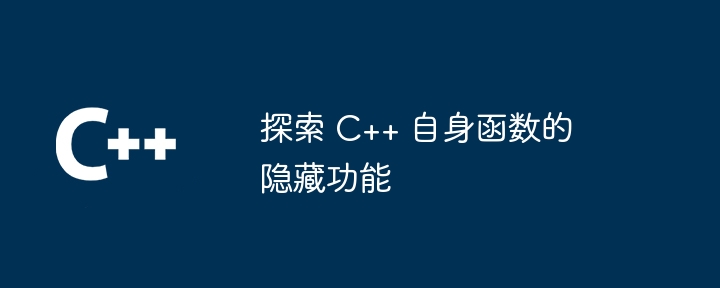c++++ 自身函数隐藏着强大功能,如:使用 & 运算符比较字符串地址使用 std::sort 对容器进行排序使用 std::find 查找数组中元素

探索 C++ 自身函数的隐藏功能
C++ 提供了众多自身函数,这些函数看似简单,却隐藏着不容小觑的功能。通过深入了解它们的特性,我们可以极大地提升代码效率和简洁性。
实战案例:字符串比较
我们经常需要对字符串进行比较,使用 std::string 类自带的 operator== 运算符即可:
#include#include using namespace std; int main() { string str1 = "Hello"; string str2 = "World"; if (str1 == str2) { cout << "Strings are equal" << endl; } else { cout << "Strings are not equal" << endl; } return 0; }
然而,operator== 运算符只能比较字符串的内容,无法比较它们的地址。
立即学习“C++免费学习笔记(深入)”;
为了比较字符串的地址,我们可以使用 & 运算符获取字符串的地址,再使用 == 运算符比较:
#include#include using namespace std; int main() { string str1 = "Hello"; string str2 = str1; if (&str1 == &str2) { cout << "Strings point to the same memory address" << endl; } else { cout << "Strings point to different memory addresses" << endl; } return 0; }
实战案例:容器排序
C++ 标准库提供了丰富的容器类型,这些容器都提供了 sort 函数,可以对容器中的元素进行排序。
例如,我们可以使用 std::sort 函数对一个整数数组进行排序:
#include#include using namespace std; int main() { int arr[] = {5, 1, 3, 2, 4}; int n = sizeof(arr) / sizeof(arr[0]); sort(arr, arr + n); // 对数组进行排序 for (int i = 0; i < n; i++) { cout << arr[i] << " "; // 输出排序后的数组 } return 0; }
实战案例:数组查找
C++ 标准库提供了 std::find 函数,可以查找数组中是否存在某个元素。
例如,我们可以使用 std::find 函数查找一个整数数组中是否包含某个元素:
#include#include using namespace std; int main() { int arr[] = {5, 1, 3, 2, 4}; int n = sizeof(arr) / sizeof(arr[0]); int element_to_find = 3; if (find(arr, arr + n, element_to_find) != arr + n) { cout << "Element found" << endl; } else { cout << "Element not found" << endl; } return 0; }
通过了解 C++ 自身函数的隐藏功能,我们可以极大地提升代码效率和简洁性。这些函数并不神秘,它们的存在是为了简化我们的编程任务。深入了解和掌握它们,将使我们成为更熟练的 C++ 程序员。




























